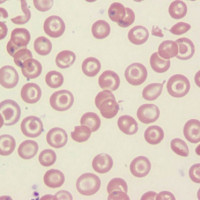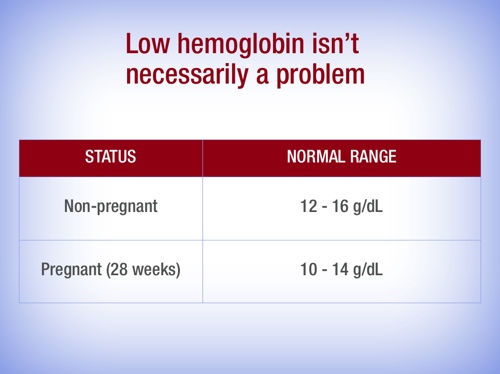
Iron is a mineral that has long been known to be important during pregnancy. It’s essential to making hemoglobin, the molecule that carries oxygen to the cells and tissues of the body. During pregnancy, blood volume increases by 30%, which means women need more iron to make more hemoglobin. This is especially true during the 2nd and 3rd trimester.
If a woman enters pregnancy without sufficient iron stores, she will become anemic during the later stages of pregnancy. This is why the Recommended Daily Allowance (RDA) for iron goes from 18 mg/d in non-pregnant women to 27 mg/d in pregnant women.
On this basis alone, we might suspect it’s essential for all women to supplement with iron during pregnancy. And that’s exactly what the mainstream health authorities recommend.
However, there are some problems with this approach.
First, it’s important to understand that it’s normal for hemoglobin levels to fall during pregnancy. As the chart below illustrates, normal levels of hemoglobin in non-pregnant women range from 12-16 g/dL. In a pregnant women @28 weeks, that range falls from 10-14 g/dL. This is a normal physiological change during pregnancy, and doesn’t indicate a problem.
Hemoglobin levels will return to the non-pregnant range in the weeks after birth. Furthermore, the best birth outcomes are associated with hemoglobin levels at the low-end of the 10-14 g/dL range.
This explains why studies show that routines supplementation of iron (without accompanying signs & symptoms of anemia) during pregnancy is not only not beneficial, but potentially harmful.
Iron supplementation does raise hemoglobin & iron levels in the blood, but it has no detectable effects on important clinical outcomes like pre-term labor, birth weight and APGAR at birth.
Iron supplementation can also be responsible for undesirable effects, such as reduced absorption of other minerals and gastrointestinal symptoms like gas, bloating and constipation.
Of course women who exhibit signs and symptoms of anemia (fatigue, shortness of breath, pale skin, cold hands & feet, etc.) should be evaluated by a physician and may need iron supplementation.

Leave A Reply (No comments So Far)
No comments yet